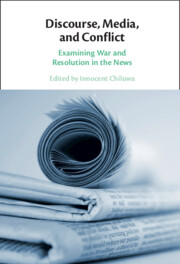Book contents
- Discourse, Media, and Conflict
- Discourse, Media, and Conflict
- Copyright page
- Contents
- Figures
- Tables
- About the Authors
- Foreword
- Introduction
- Part I Conflict Discourse in Newspaper Reporting
- Part II Electronic Media and Online Discourses of Conflict
- 5 Making a Case for War
- 6 “The Situation on the Korean Peninsula”
- 7 Against a Hard-Earned Peace
- 8 Ideological Exclusion
- 9 Violence for Social Change
- Part III Media Discourse and Conflict Resolution
- Index
- References
5 - Making a Case for War
CNN and the Representations of Humanitarianism, Gadhafi, and NATO in the 2011 Bombing of Libya
from Part II - Electronic Media and Online Discourses of Conflict
Published online by Cambridge University Press: 21 April 2022
- Discourse, Media, and Conflict
- Discourse, Media, and Conflict
- Copyright page
- Contents
- Figures
- Tables
- About the Authors
- Foreword
- Introduction
- Part I Conflict Discourse in Newspaper Reporting
- Part II Electronic Media and Online Discourses of Conflict
- 5 Making a Case for War
- 6 “The Situation on the Korean Peninsula”
- 7 Against a Hard-Earned Peace
- 8 Ideological Exclusion
- 9 Violence for Social Change
- Part III Media Discourse and Conflict Resolution
- Index
- References
Summary
Critiques of NATO’s involvement in the Libyan crisis have argued that a sober understanding of the intervention in Libya will only come to light through future studies on those that manipulated information about the conflict. However, no empirical evidence exists on the actual textual structures and strategies brought to bear by journalists in the discursive reproduction of the framework that allegedly guided the involvement of Western powers in the uprising in Libya that eventually led to a civil war in 2011. This chapter examines textual structures and discourse strategies used by CNN between February 14, 2011 and October 31, 2011 – the period General Muammar Gadhafi was killed. The authors propose new questions that may inspire arguments on whether semantic, narrative, and pragmatic acts had impacted on attitudes that validated and inspired the war in Libya.
- Type
- Chapter
- Information
- Discourse, Media, and ConflictExamining War and Resolution in the News, pp. 119 - 139Publisher: Cambridge University PressPrint publication year: 2022

